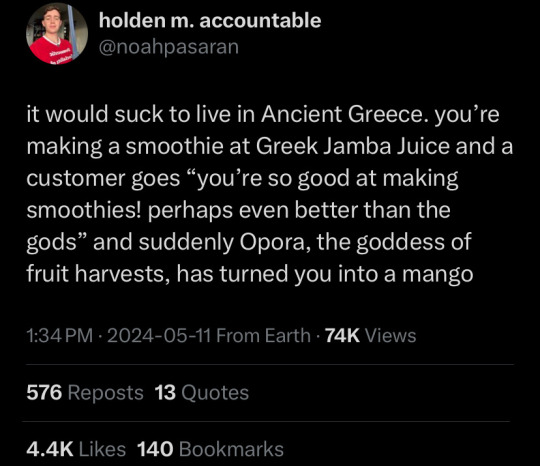Text
I have a multi chapter fluff slow burn in the works but im scared that nobody will read it because nobody will visit this tag anymore 😭😭
7 notes
·
View notes
Text
~ JEALOUSY, JEALOUSY ~ PROMPTS

requested by: anonymous
Feel free to use and reblog!
"I don't like the way he/she/they looked at you."
"Why didn't you tell me where you were?"
"No, I'm not being overdramatic!"
"Don't tell me there is nothing."
"I have eyes. I can see."
"He/She/They didn't seem 'just friendly'"
"But I wanted to do that with you! You could have asked me!"
"Who was that?"
"What was so funny? Why were you two laughing?"
"Someone said they saw you with a strange person yesterday. Why don't I know about that (from you)?"
"But I want you just for myself! I don't want to share!"
"Wouldn't you prefer to spend time with me?"
"You didn't miss me the way I missed you."
"He/She/They said WHAT?!"
"Oh, I will teach them a lesson!"
"I get it! You're jealous!" "No, I'm not. I'm just... protective. And maybe a little needy."
*grumbling* "Some people are waaay too touchy."
"No, I can't be polite to them if they're treating you like you were just there to please them."
"But I want to do something with you alone. Why did you invite someone when this could have been a date for just you and me?"
"For the last time, I'm not jealous! But I want to be the only one who looks into your eyes and holds your hand and hears your laugh. Is that too much to ask for?"
2K notes
·
View notes
Text
ἀσπάζομαι τῷ θεᾱ́τρῳ Διονύσου!

(Welcome to the theater of Dionysus!)
This is a digital temple to Dionysus, run by a priestess in training. My name is Kor (@apollonaegletes), im 23, and i use any pronouns. I've felt called to priesthood by Dionysus for a while, and after thinking about it for a while (and getting some confirmations) I decided to go for it. This is my first time running a digital temple and training to be a priestess, so have some patience with me!
I will be posting and reblogging posts related to Dionysus, worshipping him, information on him, offerings, prayers, festival celebrations, divination, etc. You are more than welcome to tag me in posts, send asks, send requests, and send submissions for any of the above as well
All who are respectful and don't intentionally harm others are welcome here. this page follows xenia
Disclaimer: I am a priestess in training, but I am not some ultimate authority on Dionysus. I'm willing to help some, but please reach out to Dionysus on your own as well: he'd love to talk to you! Additionally, my upg is just that, my personal upg. It's not the only "correct" upg, as everyone's is correct

Dionysus resources:
theoi.com (general info)
greekpagan.com (prayers)
Perseus (a bunch of Greek and Roman texts)
Homeric Hymns: [1] [7] [26]
cheat sheet
wip, feel free to suggest!
Dividers from here
10 notes
·
View notes
Text
one of the best things to do for your pagan path is to simply exist within it. It can be easy to make it foreign, unique, an experience of othering, considering we are not the norm in society—yet there is beauty in casually mentioning divinity with trusted friends, to greet the gods of the sun and moon and stars, to see the gods of the roads, ancestors, delights, animal ancestors all about—let it be your breath, your guide. To be a pagan is to consecrate the meaning, to enchant the world, to exist within it.
81 notes
·
View notes
Text
I see……
I see lady Aphrodite in those who smile and give people compliments as they pass each other
I see lady Aphrodite in those who look in the mirror and smile at their reflection as they put on makeup
I see lady Aphrodite in those who stand up for women
I see lady Aphrodite in the couples gently kissing and holding each other
I see lady Aphrodite in the laughter shared with friends as they talk about something stupid
I see lady Aphrodite in the beauty of the sea as the sunlight glistens along the surface
I see lady Aphrodite in the gentle act of gift giving, one person sharing a gift with another out of love
I see lady Aphrodite every day.
And so do you.
157 notes
·
View notes
Text
pirating a disney movie as a devotional act for lord hermes :3
78 notes
·
View notes
Text
May Dionysus Androgynous look after my trans brothers, sisters, and siblings who need it the most right now. May He bless you with the comfort of knowing you're not alone and the ability to remember how much strength you truly possess. May He grant you a glimpse into the memories of the millions of trans souls who came before us, as we have always existed, and remind you of how incredibly resilient our community has always been.
Hail Dionysus, the Great Liberator! May He break the chains that bind us all and ignite the spark of revolution within our hearts. 💜🍇🥂🏳️⚧️
787 notes
·
View notes
Text
PERSEPHONE; A GUIDE TO WORSHIP.
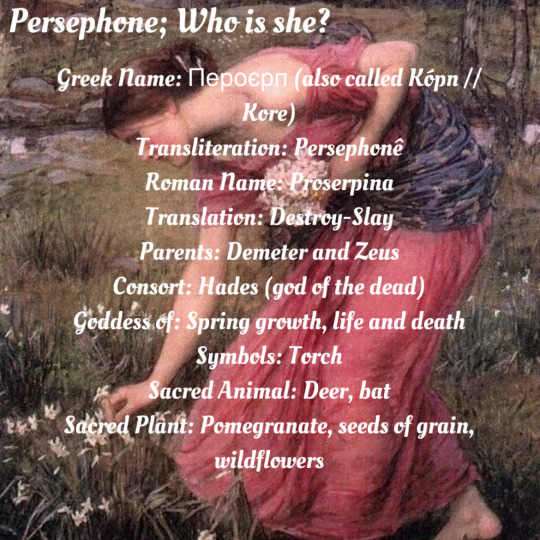
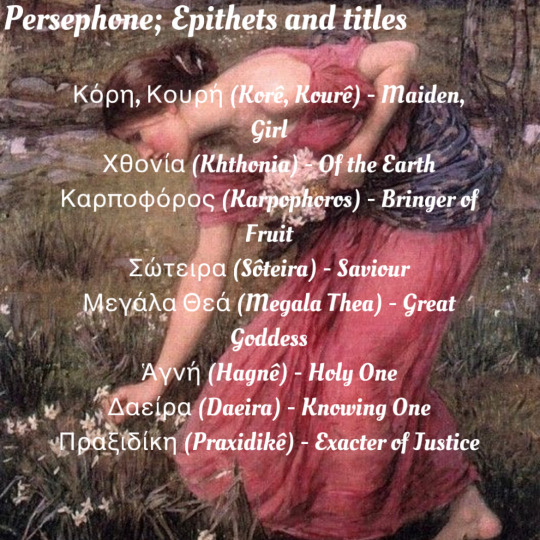
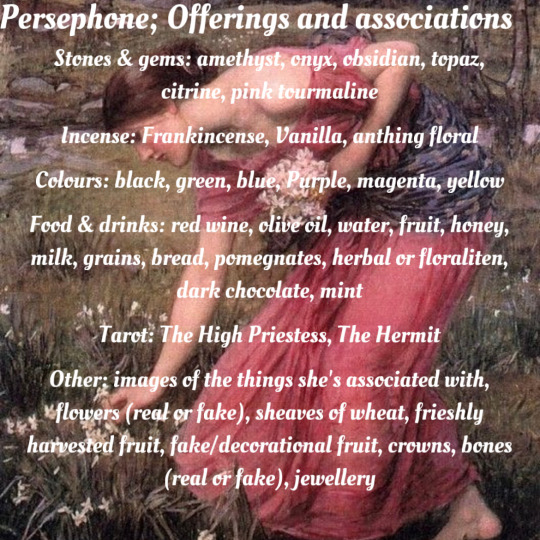
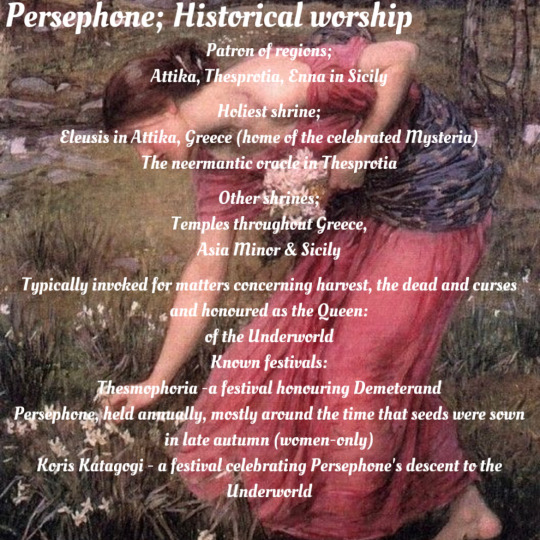
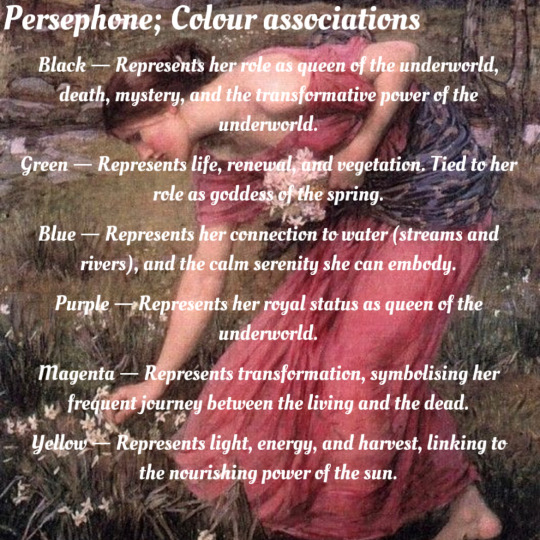
TEXT BELOW;
Persephone;
Greek Name: Пероєрп (also called Kópn // Kore)
Transliteration: Persephonê
Roman Name: Proserpina
Translation: Destroy-Slay
Parents: Demeter and Zeus
Consort: Hades (god of the dead)
Goddess of: Spring growth, life and death
Symbols: Torch
Sacred Animal: Deer, bat
Sacred Plant: Pomegranate, seeds of grain, wildflowers
Epithets and titles;
Κόρη, Κουρή (Korê, Kourê) - Maiden, Girl
Χθονία (Khthonia) - Of the Earth
Καρποφόρος (Karpophoros) - Bringer of Fruit
Σώτειρα (Sôteira) - Saviour
Μεγάλα Θεά (Megala Thea) - Great Goddess
Ἁγνή (Hagnê) - Holy One
Δαείρα (Daeira) - Knowing One
Πραξιδίκη (Praxidikê) - Exacter of Justice
Offerings and associations;
Stones & gems: amethyst, onyx, obsidian, topaz, citrine, pink tourmaline
Incense: Frankincense, Vanilla, anthing floral
Colours: black, green, blue, Purple, magenta, yellow
Food & drinks: red wine, olive oil, water, fruit, honey, milk, grains, bread, pomegnates, herbal or floraliten, dark chocolate, mint
Tarot: The High Priestess, The Hermit
Other: images of the things she's associated with, flowers (real or fake), sheaves of wheat, frieshly harvested fruit, fake/decorational fruit, crowns, bones (real or fake), jewellery
Historical worship;
Patron of regions;
Attika, Thesprotia, Enna in Sicily
Holiest shrine;
Eleusis in Attika, Greece (home of the celebrated Mysteria)
The neermantic oracle in Thesprotia
Other shrines;
Temples throughout Greece,
Asia Minor & Sicily
Typically invoked for matters concerning harvest, the dead and curses and honoured as the Queen:
of the Underworld
Known festivals:
Thesmophoria -a festival honouring Demeterand
Persephone, held annually, mostly around the time that seeds were sown in late autumn (women-only)
Koris Katagogi - a festival celebrating Persephone's descent to the Underworld
Colour associations;
Black — Represents her role as queen of the underworld, death, mystery, and the transformative power of the underworld.
Green — Represents life, renewal, and vegetation. Tied to her role as goddess of the spring.
Blue — Represents her connection to water (streams and rivers), and the calm serenity she can embody.
Purple — Represents her royal status as queen of the underworld.
Magenta — Represents transformation, symbolising her frequent journey between the living and the dead.
Yellow — Represents light, energy, and harvest, linking to the nourishing power of the sun.
25 notes
·
View notes
Text

Poseidon, the Earth-shaker. 🌊🔱
Poseidon, one of the twelve Olympian deities in Greek mythology, is revered as the King of the sea, earthquakes, storms, and horses. Often depicted wielding a trident, Poseidon stands as a powerful and influential figure, known for his volatile temperament and significant impact on the natural world. His iconic trident is frequently used to shake the earth and create springs. Poseidon is credited with creating the first horse and is closely associated with horse racing and chariots. He is known as Εννοσιγαιος, the "Earth-shaker", for his ability to cause earthquakes.
Poseidon was worshipped across various regions of Greece, holding significant cultural and religious importance in areas like Arcadia, Ionia, Boeotia, and the Dorian Peloponnesus. He was linked to agrarian concerns, natural disasters, and maritime activities.
In Homer's Odyssey, Poseidon serves as a major antagonist to the hero Odysseus, punishing him for blinding his son, the Cyclops Polyphemus, and causing his lengthy and difficult journey home.
Poseidon is a son of Kronos (Cronus) and Rheia (Rhea), making him an elder sibling to Zeus, Haides, Hera, Demeter, and Hestia. His consort is Amphitrite, a sea nymph, and together they have a son named Triton, who is also associated with the sea. Poseidon fathered many children, both divine and mortal, including notable figures such as Theseus, Polyphemus, and Pegasos.
He was worshipped in coastal cities and islands, several major temples were dedicated to him, such as the Temple of Poseidon at Sounion in Greece.
Sailors and fishermen often prayed to him for safe voyages and abundant catches.
Χαῖρε Ποσειδῶν!
🔱
88 notes
·
View notes
Text
The gods are everywhere;
Every time someone falls asleep on your shoulder, that is Hypnos with you
Every time you have that random boost of self-love, that is Aphrodite with you
Every time you are courageous, that is Ares with you
Every time you find joy in music or poetry, that is Apollo with you
Every time you let yourself relax and drink, that is Dionysus with you
Every time you stand up for what is right, that is Zeus with you
Every time you travel, that is Hermes with you
Every time you remember a dream, that is Morpheus with you
The gods are everywhere, even if we cannot see them
797 notes
·
View notes
Text
One thing I can't help but wonder.
Artemis is not the only virgin goddess in the Hellenic pantheon. And yet it appears, among modern pagans, virginity is the first (often times only) thing to come to mind whenever Artemis is mentioned. So much is focused around her being a virgin, it's gotten to a point where who she actually is, how she was worshipped in ancient Greece, and her presence in the lives of the ancient Greeks are completely lost among misinformations and misconceptions stemming from only one aspect of her.
For Athena and Hestia, it's always their various roles and domains that people will immediately think about. But for Artemis, it's always her body and marital status, for some reason. It's utterly ridiculous.
Because to the ancient Greeks, Artemis was a perpetually unwed maiden goddess, yes, but she was not the goddess of virginity. According to Stephanie Budin and colleagues, Artemis was the goddess of the hunt and wilderness, and she was responsible for helping women in childbirth, turning children into adults, bringing light, freeing slaves, marking boundaries between territories and periods, bringing and curing plague. Her epithets emphasized her "wild" qualities, expressed her proclivity for the hunt, as well as described her as a "kourotrophos" (child nurturer and protector of the young) and a lunar deity.
It's like, why is it never a problem for everybody to accept that Athena and Hestia had worshippers of all ages, sexes, gender roles, and social statuses throughout ancient times, but it's so hard to wrap minds around this about Artemis.
Artemis, Athena, Hestia, all three goddesses preserve their virginity for important reasons pertaining to their roles in Greek ideology. Artemis's virginity established her position in the divine hierarchy. As the goddess of the wilds and wild animals, she herself could not be tamed (damazo) by sex, as other females in the Greek literature, and especially brides, were said to be (paraphrasing Stephanie Budin, Artemis, 2016).
In a nutshell, these goddesses are virgins and never married because of, as a result of, and due to their personas, functions, their parts in the pantheon and the areas they preside over. They chose the path of virginity because of who they are and what their "jobs" are. It doesn't mean they are rulers of maidenhood and virgins.
261 notes
·
View notes
Text
She is everywhere

❊ Hera Aeromorphus. Queen having the form of air, I find you in the cool breeze that blesses the start of my day
❊ Hera Exacestrerius. Queen who averts evil, I find you in mothers who protect their children with everything. Teeth bared and ready to fight.
❊ Hera Kallstephanus. Beautifully crowned queen. I find you in young children playing princess games. They run with tiaras, and I pray you will bless their childhood.
❊ Hera Cydra. Illustrious queen, I find you in the golden sunrays that bring joy to the darkest days. Giving me the strength to keep going
❊ Hera Makaira. Blessed queen, I find you in joyful moments with my friends. Moments of girlhood that are held close to my heart.
❊ Hera Antheia. Friend of flowers, I find you in floral perfumes and floral cakes. In the first bloom of spring that awakens the Earth from Her deep slumber.
❊ Hera Hypercheiria. Queen who protects those under her hand, I find you in my younger siblings. I will do my best to keep them safe, and I pray you will watch over as I do.
❊ Hera Gamelia. Queen of marriage, I find you in wedding halls and the rusted wedding ring my grandma wears. A promise, A vow, until Death do them part.
Queen of many names, Queen of All. Bride and widow, Marriage and Love, Heavens and the Earth. Guide us with your watchful gaze, catch me when I stray. Hail queen of Olympus, praised be your name.

235 notes
·
View notes
Text
HEBE; A GUIDE TO WORSHIP.





Text of the images below this point;
Hebe;
Greek Name: Ήβη
Transliteration: Hêbê
Roman Name: Juventas
Translation: Youth
Parents: Zeus and Hera
Consort: Heracles (Hero and demigod.)
Goddess of: Youth
Symbols: Cup or pitcher
Sacred Animal: Hen
Sacred Plants: Ivy
Epithets and titles;
Βασίλεια (Basileia) - Princess
Δία (Dia) - Daughter of Zeus
Γανυμέδη (Ganymêda) - Gladdening Princess
Πάριος (Parios) - Of Paros
Μάκαιρα (Mákaira) - Blessed
Χρυσόστεφανος (Chrysostephanos) - Golden-crowned
Καλλίσφυρος (Kallísphyros) - Beautiful-ankled
Πότνια (Potnia) - Lady
Offerings and associations;
Stones & gems: agate, angelite, hematite, quartz, rose quartz
Incense: Frankincense
Colours: gold, white, pink
Food & drinks: red wine, olive oil, water, fruit, honey, milk
Tarot: Temperance
Other: images of the things she's associated with, feathers, cups, childhood toys, flowers, cypress, ivy leaves
Historical worship;
Patron of regions;
Attika, Sikyonia, Arkadia, Argos
Holiest shrine;
Possibly Sikyonia or Phlios
Other shrines;
a few shrines throughout Greece
Typically invoked for matters concerning youth, marriage and forgiveness
Often worshipped along with Hera, Aphrodite and Heracles
Known festivals:
Kissotomoi (the days of ivy-cutting) - an annual festival honouring Hebe celebrated in Phlios.
Colour associations;
White — Represents purity. Also represents radiance and youth.
Gold — Represents the connection she has to the gods and her divine status as the cup-bearer. Also represents her youthful beauty and her role in sustaining immortality.
Pink — Represents youth, tenderness, and vitality. Also represents femininity, grace, and love.
14 notes
·
View notes
Text
It’s okay not to be serious all the time with the gods. It’s okay to joke around and be silly with the gods on occasion. It’s okay to be casual with the gods on occasion. But there is a difference between fun and disrespect and misinformation. Respect yourself, respect the gods.
247 notes
·
View notes
Text
vent-ish post?? you don't have to read it lol
i hate being in the broom closet. i hate having parents who won't accept my practice. i hate not being able to have fancy altars. i hate not being able to pour libations every day. i hate not being able to pray out loud. and yes, i know that due to my circumstances, what i'm doing is enough and the gods appreciate the effort nonetheless. but i wish it didn't have to be this way. i wish i could do more :(
47 notes
·
View notes

